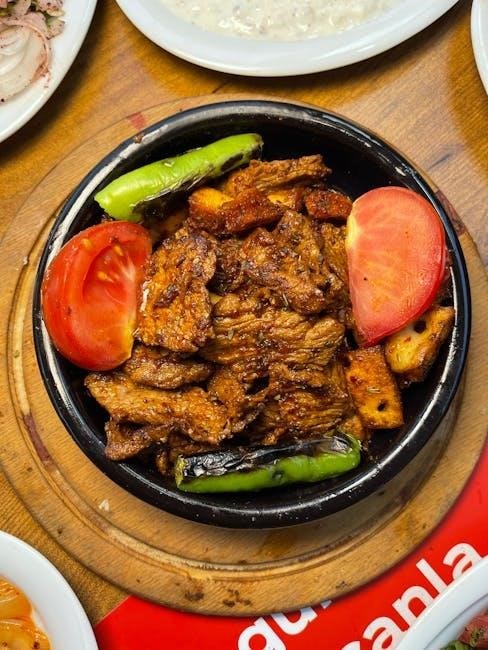who cooked the last supper pdf
The book Who Cooked the Last Supper is written by Rosalind Miles and first published in 1988 as The Womens History of the World online․
Overview of the Title and Author
The title of the book is Who Cooked the Last Supper, initially published as The Womens History of the World, written by Rosalind Miles Ph․D․
The author is a British writer, and the book was first published in 1988, with later editions having the new title, including paperback versions of the book․
The book provides an alternative perspective on history, focusing on the role of women, and the author’s writing style is described as vividly accessible and piquantly funny․
The book’s title refers to the traditional male-dominated narrative of history, and the author’s goal is to restore women to their rightful place at the center of culture and history․
The author’s credentials and expertise in the field of women’s history are evident in the book’s content and style․
The book has been well-received by readers, who appreciate its unique perspective and engaging writing style․
The author’s work has contributed significantly to the field of women’s history and has helped to overturn centuries of preconceptions about women’s roles in society․
The book is a valuable resource for anyone interested in women’s history and its impact on modern society․
The author’s writing is informative, yet entertaining, making the book an enjoyable read for a wide range of audiences․
The book’s significance extends beyond its historical content, as it also provides insight into the social and cultural context of women’s lives throughout history․
The author’s use of language is clear and concise, making the book accessible to readers with varying levels of knowledge about women’s history․
The book is a testament to the author’s dedication to uncovering the truth about women’s roles in history and sharing it with the world․
The author’s work has paved the way for further research and discussion about women’s history and its importance in understanding modern society․
The book is an essential read for anyone looking to gain a deeper understanding of women’s history and its impact on the world․
The author’s unique perspective and engaging writing style make the book a compelling read for audiences interested in history, sociology, and women’s studies․
The book’s content is well-organized and easy to follow, making it a valuable resource for students and researchers alike․
The author’s use of historical examples and anecdotes adds depth and context to the book’s narrative, making it a rich and engaging read․
The book is a significant contribution to the field of women’s history and a must-read for anyone interested in the subject․
The author’s work has helped to challenge traditional narratives and promote a more inclusive understanding of history․
The book’s impact extends beyond the academic community, as it has also helped to raise awareness about the importance of women’s history and its relevance to modern society․
The author’s dedication to the subject is evident throughout the book, and her passion for women’s history is inspiring and thought-provoking․
The book is a valuable addition to any library or collection of books on women’s history and is sure to be a treasured resource for years to come․
The author’s unique voice and perspective make the book a standout in the field of women’s history, and her writing is sure to resonate with readers from diverse backgrounds and disciplines․
The book’s significance is undeniable, and its impact will be felt for generations to come, as it continues to inspire and educate readers about the importance of women’s history․
Content and Style of the Book
The book features vividly accessible writing and piquantly funny prose that informs without being didactic and conveys history in an engaging online format always․
Accessible Writing and Tone
The book Who Cooked the Last Supper features accessible writing that makes history engaging and easy to understand for a wide range of readers online․
The tone of the book is witty and humorous, making it an enjoyable read for those interested in learning about women’s history and their contributions․
The author’s use of vivid language and storytelling techniques helps to convey complex historical information in a clear and concise manner, making the book a valuable resource for anyone looking to learn about the subject․
The writing style is approachable and free of jargon, allowing readers to easily follow along and understand the material being presented, with a new introduction added to later editions․

Historical Significance and Contributions
Restores women to their rightful place in history with significant contributions online always․
Rethinking Preconceptions about Women in History
The book Who Cooked the Last Supper challenges traditional views of women in history, presenting a fresh perspective on their roles and contributions․
The author Rosalind Miles provides a comprehensive overview of women’s experiences throughout history, from prehistoric times to the present day, using a range of sources and evidence to support her arguments․
By examining the lives and achievements of women from different cultures and backgrounds, the book aims to overturn centuries of preconceptions and stereotypes, revealing the significant impact that women have had on shaping the course of human history, and offering a more nuanced and accurate understanding of women’s lives and experiences․
This approach enables readers to rethink their assumptions about women in history and to gain a deeper appreciation of the important contributions that women have made․

Reader Reception and Reviews
Readers praise the book for its witty and accessible writing style online always․
Positive Reception and Bias Consideration
Readers have praised the book for its unique perspective and engaging writing style, noting that it informs without being didactic․ The book’s ability to convey the weight of injustice without hostility or political agenda has been particularly appreciated․ Some readers have noted that the book is somewhat biased, but consider this a necessary counterbalance to the prevailing narratives․ The book’s positive reception can be attributed to its vividly accessible writing and piquantly funny prose, which makes it an enjoyable read․ The consideration of bias is also an important aspect, as it acknowledges the potential for skewed perspectives and encourages readers to think critically․ Overall, the book’s positive reception is a testament to its thought-provoking and engaging content․ The book has been well-received by readers who appreciate its fresh perspective on history․
Key Themes and Discussions
Evolution and womens role in shaping history are central themes explored online always․
Evolution and the Role of Women
The book explores the concept of evolution and the significant role women played in shaping history, including the development of right-handedness, as mentioned by the author, this theory suggests that women, who were the primary gatherers, carried their babies on their left hip, freeing their right hand to work, thus making right-handedness dominant, this idea is presented in a vivid and accessible manner, allowing readers to understand the importance of women’s contributions to human evolution, the author’s use of examples and anecdotes makes the topic engaging and easy to follow, providing a fresh perspective on the history of women and their impact on the world, the discussion of evolution and women’s role in it is a key aspect of the book․

Publication and Editions
First published in 1988 as The Womens History of the World with later editions titled Who Cooked the Last Supper online easily․
Initial Publication and Later Editions
The book was first published in 1988 as The Womens History of the World, with later editions being titled Who Cooked the Last Supper․
The initial publication marked the beginning of a new perspective on women’s history, and the later editions further expanded on this concept․
The paperback versions of the book were also titled Who Cooked the Last Supper, making it more accessible to a wider audience․
The book’s publication and subsequent editions have played a significant role in shaping the discourse on women’s history and their contributions to society․
With each new edition, the book has continued to inform and educate readers about the often-overlooked role of women in shaping the world․
The book’s impact is a testament to the power of knowledge and the importance of sharing women’s stories․

on the Book’s Impact
The book has lasting influence and significant impact on readers and society today online always․
Lasting Influence and Recommendations
The book Who Cooked the Last Supper has a lasting influence on its readers, providing a new perspective on women’s history and their role in shaping the world․ With its vividly accessible writing and piquantly funny prose, the book is a must-read for anyone interested in history and women’s studies․ The author’s recommendations for further reading and exploration are also valuable, providing a starting point for those who want to learn more about the subject․ Overall, the book is a significant contribution to the field of women’s history and is highly recommended for its insightful and engaging approach to the topic, making it a great resource for online learning and research purposes every day․
